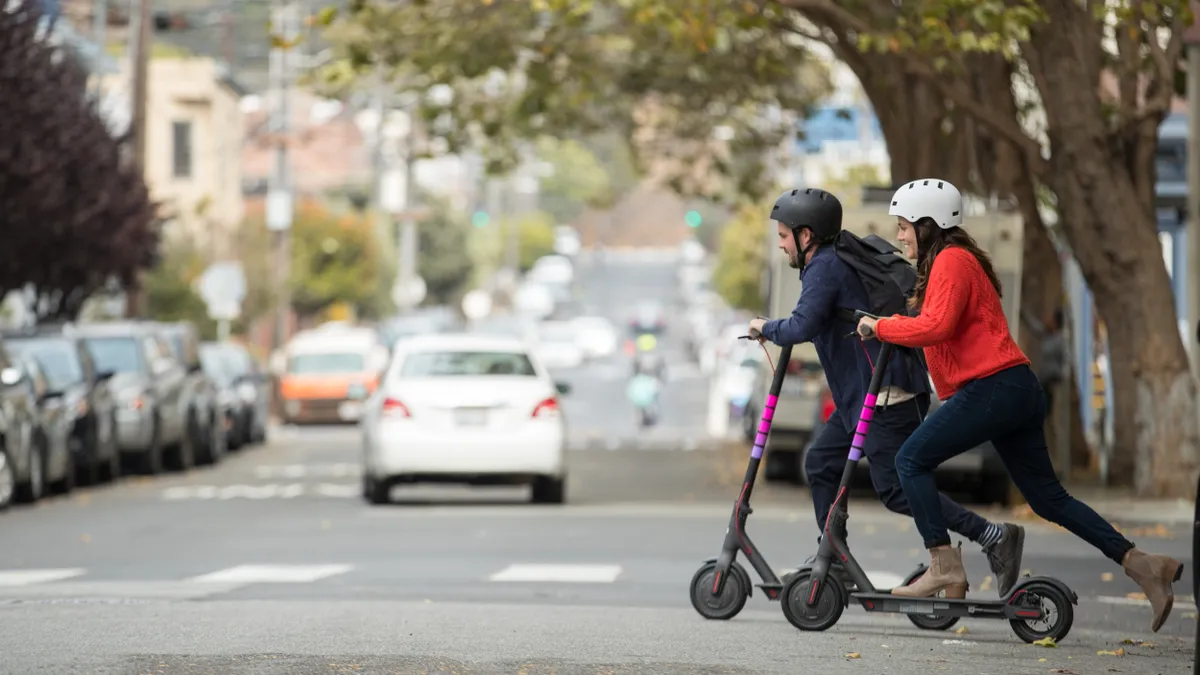Dive Brief:
- Three specialists from the Centers for Disease Control and Prevention (CDC) will partner with Austin Public Health and the Austin Transportation Department (ATD) to examine dockless scooter use, according to an ATD online presentation. This is the CDC's first epidemiological study on dockless scooters, ATD says.
- The study will examine the health risks associated with the scooters in Austin, TX between Sept. 5 and Nov. 4 this year, centering on 37 emergency responder calls and 68 scooter injury reports from area hospitals.
- Austin implemented dockless bike and scooter regulations last month and is expected to re-examine the ordinance at the end of February. The city council could take further action on dockless vehicle governance in the spring and could incorporate some of the findings from the partnership with the CDC.
Dive Insight:
The ATD presentation indicates Austin is in the process of gathering and analyzing data that could lead to ordinance changes in the spring. It is reportedly looking to develop a "location-specific ordinance" governing dockless vehicle locations and speeds. This insinuates that the city might add restrictions on where and how dockless services can operate.
The six service providers authorized to operate in the city have a collective 11,000 scooters on the streets, according to ATD. Each service provider has its own designated areas where it is allowed to operate, with an awful lot of overlap and intentional device concentration downtown. The devices in the highly-trafficked downtown area compete for space with pedestrians and motorists, and users regularly can be seen attempting to weave through crowds on sidewalks, with varying levels of success. While nothing has been laid out yet, perhaps Austin's dockless ordinance update would attempt to thin the fleets in areas of high concentration or lower the allowed speeds in high-traffic areas.
With the sudden proliferation of scooters in Austin and other U.S. cities has come a sharp spike in reported injuries, and even deaths, related to the devices. Some mobility companies have fielded some criticism for releasing the motorized devices in cities without first implementing widespread educational campaigns, essentially letting users fend for themselves with learning how to safety operate e-scooters.
The CDC will study EMS calls and scooter injuries it classifies as reported through "syndromic surveillance." The CDC says syndromic surveillance "serves as an early alert for health events by tracking symptoms... before a diagnosis is confirmed." It is basically a way to research and get a leg up on potential health outbreaks before they get out of control.
The CDC examines both natural and human-made health threats, including suicide and gun violence, and the dockless vehicle study falls into the human-made threat category. Austin provides a good case study for this project because it was one of the first cities to adopt dockless vehicles last year and it has one of the largest e-scooter programs in the country. Cities across America undoubtedly will be closely watching for the results of the report to inform decisions and policies related to their own dockless mobility programs.












